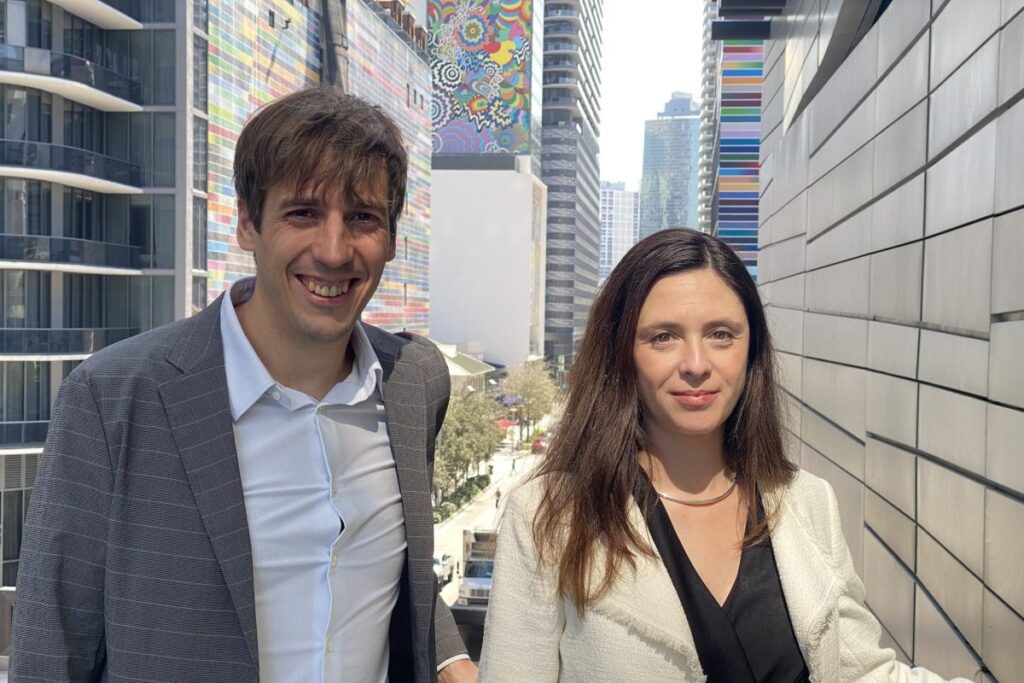When companies take shortcuts to build their software stack, prioritizing speed and quick-fixes over quality and long-term scalability, they can end up with what’s known as “technical debt.” Essentially, if a codebase is not constructed properly, as it grows, it will become more complex, cost more to maintain, and it’ll become ever harder to add new features. And as with most kinds of debt, the problems can grow exponentially if left unaddressed.
This is something that Moderne is setting out to solve. The company analyzes all the components that make up a company’s stack, handles framework and library migrations to ensure that they’re up-to-date, fixes security vulnerabilities, and even upgrades older tech to modern cloud-native equivalents.
Built atop OpenRewrite, an automated code refactoring ecosystem that helps developers make large-scale changes across codebases, Moderne is the handiwork of Jonathan Schneider and Olga Kundzich (pictured above) who respectively served in senior engineering and product management roles at Pivotal, which VMware acquired for $2.7 billion in 2019.
Prior to Pivotal, Schneider was senior software engineer at Netflix, where he helped create Rewrite, an internal project focused on automating the refactoring of Java code. This project eventually morphed into OpenRewrite and went open-source, with big-name adopters in hot pursuit.
Indeed, back in October, Microsoft announced the GitHub Copilot upgrade assistant, which leans on OpenRewrite as part of an AI-enabled tool for updating Java apps. Amazon’s AWS announced a similar integration as part of its Q Code Transformation tool back in 2023.
But while OpenRewrite provides a powerful foundation to automating the code refactoring process, Moderne turbocharges it with features to make it more scalable across an enterprise setting. The startup offers support for multiple-repositories and more complex workflows; collaboration via a web-based user interface; and reporting and analytics.

Founded out of Miami, Florida, in 2020, Moderne has so far raised around $20 million in funding. Today, the company is adding a further $30 million to the pot via a Series B round led by Acrew Capital, with participation from Allstate, Amex Ventures, Intel Capital, Mango Capital, Morgan Stanley, TIAA Ventures, and True Ventures.
Moderne claims just 50 employees today, who Schneider says, are mostly “seasoned experts in every functional domain,” enabling it to keep a lower total headcount. With the fresh $30 million, he says he’s now looking to better cater to specific domains like application security (AppSec), having recently hired its first chief information security officer (who will be formally announced later this week).
This expansion also guided Moderne’s decision around its lead investor — Acrew Capital founding partner Mark Kraynak has traditionally invested in cybersecurity companies.
“We selected Acrew and Mark for this round with the intention of really building up that muscle of AppSec auto-remediation,” Schneider told TechCrunch.
‘Tech stack liquidity’
Much has changed since Moderne raised seed funding back in 2021. At the outset, the company was substantively about “code modernization,” but it has evolved into what Schneider calls “tech stack liquidity,” which refers to any change a business wants to achieve across its whole codebase. This might be cloud platform migration, switching feature-flag vendors, or trying to avoid database vendor lock-in.
Often, this kind of work would be carried out by consultancy firms who would parachute in and painstakingly comb through a company’s codebase repository by repository. This “manual work,” Schneider says, is Moderne’s core competitor.
“This is a multi-billion-dollar problem across the industry that Moderne is ideally suited to address,” he said.
Like just about every tech company today, Moderne is also benefiting from the large language model (LLM) revolution. Last year, the company introduced “AI-assisted auto-refactoring,” which promises the necessary “accuracy and efficiency” to transform code at scale across multiple repositories. This sits in contrast to LLM-enabled coding assistants that you might see in GitHub’s Copilot, for instance, which is more about local, context-specific code snippets rather than giant codebase transformations.
Schneider says Moderne was well-suited to LLMs due to OpenRewrite’s Lossless Semantic Tree (LST) code representation — a structured representation of source code that enables deeper semantic understanding while retaining the original details (e.g. whitespace, comments, and syntax). Originally, this was designed for an OpenRewrite feature called Recipes, but it ended up being the “ideal data source” for what OpenRewrite is now doing with AI.
“These [LLM] models are data-hungry, and LST has proven to be an invaluable data source for code,” Schneider said. “The LST captures deep structural and semantic context across thousands of repositories. This unique capability allows Moderne to fuel AI models with vital context, enabling agentic experiences that can drive modernization, security, and code analysis efforts on a massive scale.”
It’s worth noting that Moderne also transitioned its main web domain from “.io” to “.ai” last year, signifying that it’s now very much an AI-centric company.
“The move to the ‘.ai’ domain […] reflects a strategic evolution,” Schneider said.
‘Modernization never ends’
A quick peek at Moderne’s customer base is telling of who is most likely to benefit from its technology — companies like Walmart and insurance giant Allstate. Its investor base includes names from the enterprise world such as American Express and Morgan Stanley, which, while unconfirmed, is safe to assume have invested strategically.
But it’s not just about gargantuan enterprises with unwieldy code sprawl — Schneider notes that his company’s smallest customer has just six developers. Plus, even once a dusty-old enterprise stack has been given a Moderne makeover, it doesn’t mean the job’s done. The “optimal” tech stack is constantly evolving: new components replace old ones, and best practices shift in tandem.
Put simply, technical debt is always going to be a problem as companies pursue that “north star” architecture.
“Ask any tech executive if they ever reach that ‘north star’ before it moves,” Schneider said. “Codebases are in a constant state of evolution, requiring updates, security fixes, consolidation, improvements — modernization never ends. Ironically, the most modern tech stacks are the ones most susceptible to breakage from the rapid iteration of the third-party and open-source dependencies on which they rely.”







